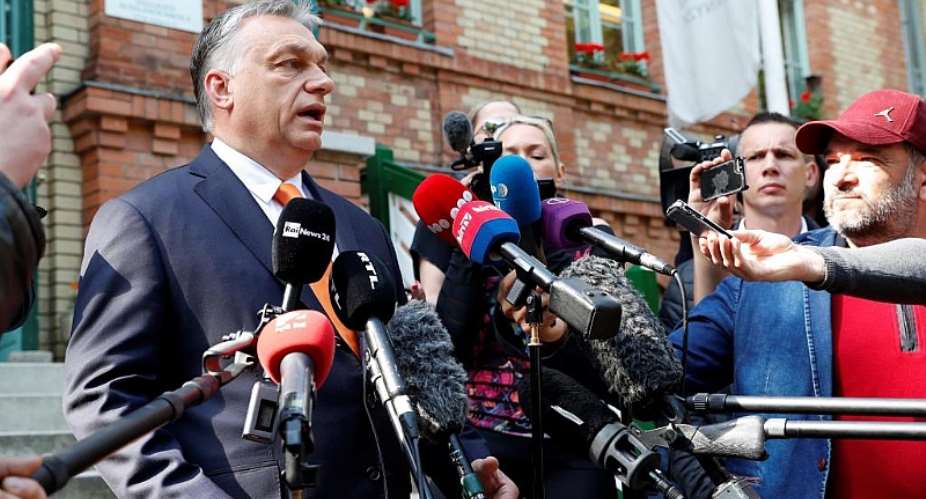European far-right and populist leaders hailed election results on Sunday, with some calling for a common group in the EU Parliament. Turnout across the bloc was the highest in 20 years for a poll billed as a battle between populists and pro-European forces.
More than 200 million citizens across the 28-nation bloc cast their votes on Sunday for 751 EU parliament seats, with Eurosceptic forces making strong gains.
Eurosceptic parties hoped to capture as many as a third of the seats in the EU parliament, disrupting Brussels' pro-integration consensus.
French far-right leader Marine Le Pen won her symbolic duel with President Emmanuel Macron. Lead campaigner for her National Rally party, Jordan Bardella, said: “The gains for our allies in Europe and the emergence of new forces across the continent... open the way for the formation of a powerful group. "
In Hungary the Fidesz party of nationalist Prime Minister Viktor Orban looked set for a big win, with polls giving it around 56 percent of the vote, while in Poland the ruling right-wing Law and Justice party (PiS) took 42.4 percent to edge the opposition liberal coalition.
In Italy, where voting is to wrap up at 11pm, polls give the far-right League of Prime Minster Matteo Salvini more that 35 percent of the vote.
But the far-right have not had everything go their way.
Greens gain in Germany, centre-right climb in Greece
In Germany, exit polls show Chancellor Angela Merkel's centre-right CDU maintaining the largest vote share, despite an historic low result of 28 percent, sharply down from 35.4 percent in 2014.
The far-right Alternative for Germany took 10.5 percent, better than 2014 but less than its result in national polls in 2017.
The big winners in Germany were the Greens, with the largest share of seats in the EU parliament, doubling their score to 22 percent, in second place.
The centre-left Social Democrats fells to 15.5 percent from 27.3 percent in 2014.
In the Netherlands, the centre-left party of EU vice president Frans Timmermans emerged a surprise comeback winner to upset the populist Eurosceptic parties.
In Austria, the centre-right People's Party of Chancellor Sebastian Kurz was on course to gain seats, with the Social Democrats in second and the far-right Freedom Party (FPOe) coming third.
The results follow a corruption scandal in the FPOe that led Kurz to dissolve his coalition with the far-right party and call early elections for the autumn.
In Greece, voters dealt a huge blow to Prime Minister Alexis Tsipras' Syriza party, giving the opposition conservative New Democracy party a lead of over eight points, exit polls indicated.
Changing influence in European politics
Europe's mainstream parties are vying between themselves for influence over the choice of a new generation of top EU officials, including the powerful president of the European Commission.
Britain and the Netherlands were first to vote, on Thursday, followed by Ireland and the Czech Republic on Friday with Slovakia, Malta and Latvia on Saturday, leaving the bulk of the 400 million eligible voters to join in on Sunday.
The UK vote comes amid the prolonged uncertainty of Brexit, and even if Britain does finally leave the EU on 31 October, the latest deadline set for its Brexit date, its MEPs could still play a key role in the summer scramble to hand out top jobs at EU parliament.





 Dumsor: Don't rush to demand timetable; the problem may be temporary — Atik Moha...
Dumsor: Don't rush to demand timetable; the problem may be temporary — Atik Moha...
 Space X Starlink’s satellite broadband approved in Ghana — NCA
Space X Starlink’s satellite broadband approved in Ghana — NCA
 2024 election will be decided on the grounds of the economy; choice of running m...
2024 election will be decided on the grounds of the economy; choice of running m...
 Dumsor: We're demanding less; just give us a timetable — Kwesi Pratt to ECG
Dumsor: We're demanding less; just give us a timetable — Kwesi Pratt to ECG
 Do I have to apologise for doing my security work, I won’t – Simon Osei-Mensah r...
Do I have to apologise for doing my security work, I won’t – Simon Osei-Mensah r...
 All my businesses have collapsed under Akufo-Addo — NDC Central regional chair
All my businesses have collapsed under Akufo-Addo — NDC Central regional chair
 Military, Prison Officers clash in Bawku, three injured
Military, Prison Officers clash in Bawku, three injured
 GRA-SML contract: MFWA files RTI request demanding KPMG report
GRA-SML contract: MFWA files RTI request demanding KPMG report
 Court threatens to call second accused to testify if NDC's Ofosu Ampofo fails to...
Court threatens to call second accused to testify if NDC's Ofosu Ampofo fails to...
 Family accuses hospital of medical negligence, extortion in death of 17-year-old...
Family accuses hospital of medical negligence, extortion in death of 17-year-old...
